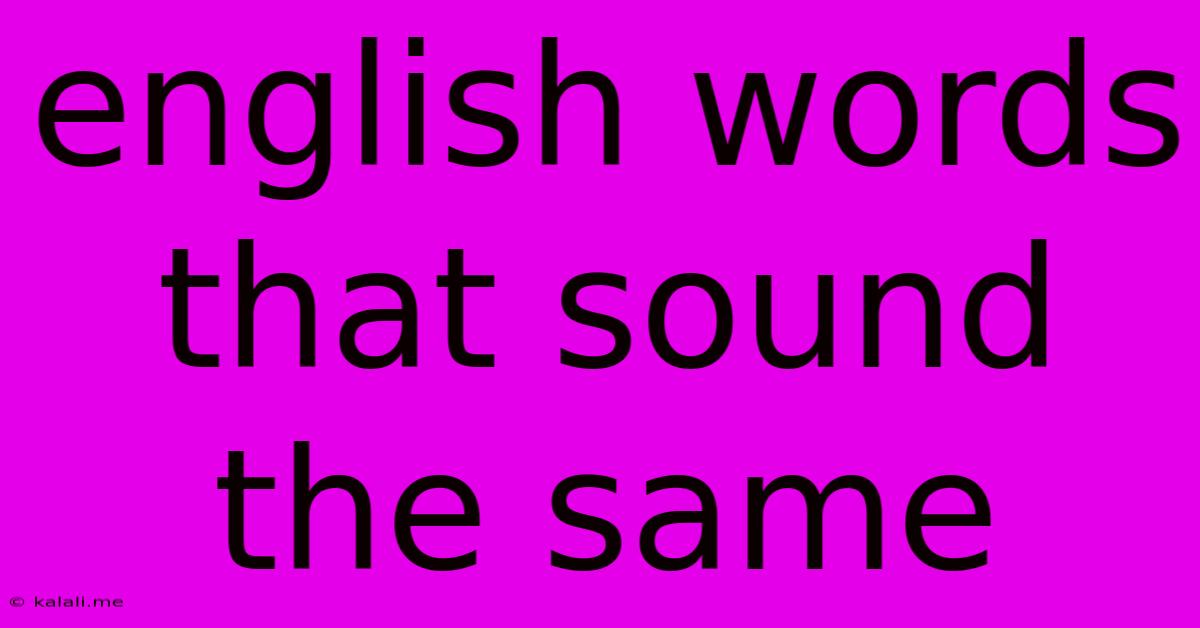English Words That Sound The Same
Kalali
Jun 07, 2025 · 3 min read

Table of Contents
Decoding Homophones: English Words That Sound Alike
This article explores the fascinating world of homophones – words that share the same pronunciation but have different meanings and spellings. Mastering these linguistic twins is crucial for clear communication and effective writing, and understanding them enhances your overall English vocabulary and comprehension. This guide will help you navigate the common pitfalls of homophones and improve your written and spoken English.
What are Homophones?
Homophones are words that sound the same but have different meanings and often different spellings. They can be a source of confusion, especially for non-native English speakers, but recognizing and understanding them is a key component of strong English language skills. Think of them as the mischievous twins of the English language, always ready to trick the unwary.
Common Examples and Their Meanings:
Let's delve into some of the most frequently encountered homophones, exploring their subtle yet significant differences in meaning:
-
There, Their, They're: This trio is a classic example. "There" indicates a place; "their" shows possession; and "they're" is a contraction of "they are." Example: "They're going over there to retrieve their belongings."
-
Your, You're: Similar to the previous example, "your" denotes possession, while "you're" is a contraction of "you are." Example: "You're welcome to use your phone."
-
Hear, Here: "Hear" relates to the sense of sound; "here" indicates a place or location. Example: "Come here, I need you to hear this."
-
See, Sea: "See" refers to sight; "sea" is a large body of saltwater. Example: "I can see the vast expanse of the sea from here."
-
To, Too, Two: "To" is a preposition indicating direction or purpose; "too" means "also" or "excessively"; and "two" is the number 2. Example: "I'm going to the store, too, to buy two apples."
-
Write, Right, Rite: "Write" means to compose text; "right" means correct or a direction; and "rite" refers to a ritual or ceremony. Example: "Make sure you write the address down right, the initiation rite is important."
Why Understanding Homophones Matters:
Mistaking one homophone for another can significantly alter the meaning of a sentence, leading to misunderstandings and even grammatical errors. Accurate usage is essential for clear communication, both in writing and speaking. Mastering homophones demonstrates a strong command of the English language and enhances your credibility as a writer or speaker.
Tips to Avoid Homophone Errors:
- Proofread Carefully: Always review your work thoroughly before submitting it. Reading aloud can help you catch errors you might miss when reading silently.
- Use a Dictionary or Thesaurus: If you're unsure about the correct spelling or meaning of a word, consult a reliable reference source.
- Learn Commonly Confused Pairs: Focus on memorizing the most frequently confused homophones. Create flashcards or use mnemonic devices to aid memorization.
Mastering homophones is a journey, not a destination. Consistent practice and attention to detail will significantly improve your English proficiency and ensure clear, effective communication. Embrace the challenge, and watch your writing and speaking skills flourish!
Latest Posts
Latest Posts
-
How Does Reach And A Glaive Work In Dnd 5e
Jun 08, 2025
-
Garage Door Only Closes If I Hold Button Down
Jun 08, 2025
-
Can You Win Uno With A Wild Card
Jun 08, 2025
-
Hampton Bay Ceiling Fan Wiring Diagram
Jun 08, 2025
-
Is Pre Shared Key A Password On Router
Jun 08, 2025
Related Post
Thank you for visiting our website which covers about English Words That Sound The Same . We hope the information provided has been useful to you. Feel free to contact us if you have any questions or need further assistance. See you next time and don't miss to bookmark.